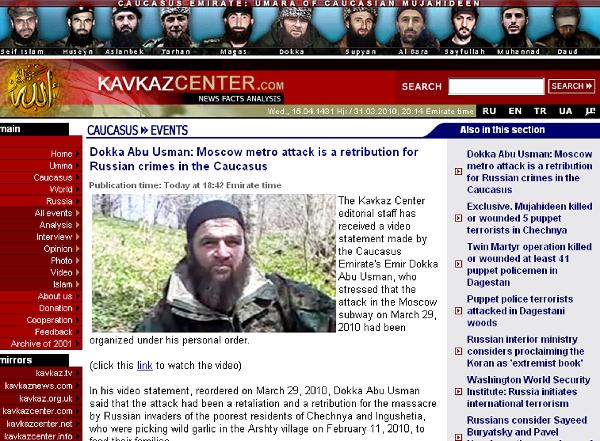Chechen rebel group claims Moscow metro bombings
A Chechen militant group on Wednesday claimed responsibility for Monday's twin bombing attacks against the Moscow metro system.
The claim was made through an online video clip, in which Doku Khamatovich Umarov said Monday's twin suicide attacks was revenge for the killing of civilians by Russian security forces.
Umarov, former underground president of the unrecognized Chechen Republic of Ichkeria, is now self-proclaimed emir of the Russian North Caucasus.
The rebel leader is wanted by the Russian security forces for alleged crimes of terrorism, kidnapping, murder and treason.
Umarov's online video was posted after Russian Prime Minister Vladimir Putin had vowed to drag "out of the sewer" the terrorists behind the attacks that killed 39 people and injured 60 others.
Putin told a televised cabinet meeting on Wednesday that the same militant group could have planned another attack in the day in Dagestan where 12 people were killed and 23 others were injured.
Dressed in fatigues, Umarov said in the video that the war would come to the streets of Moscow and the Muscovites would feel it on their own skins.
The video clip was posted on kavkazcenter.com, a website used by rebels to publicize their statements.
Moscow city police have been on high alert since Monday's twin bombings. They have set up roadblocks on highways leading into the city and have beefed up patrols in the subway and are keeping their eyes open on migrants from southern provinces.
Terror attacks in Chechnya and Dagestan, however, are not uncommon and are mostly targeting police and security forces, which local rebels take as representing the Russian authorities.
Several rebel leaders, including one known for training suicide bombers, have been killed in the North Caucasus in the latest round of law enforcement launched by Russian President Dmitry Medvedev.
But Monday's suicide attacks in Moscow were the first away from the base areas of the southern rebels in the past six years.
Umarov seemed to have deliberately chosen to bomb the Lubyanka subway station, which is beneath the Russian Federal Security Service.
According to a report by the Center for Strategic and International Studies, 916 people died in violence in the North Caucasus last year, up from 586 in the previous year.
 0
0 







